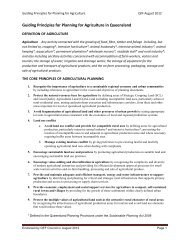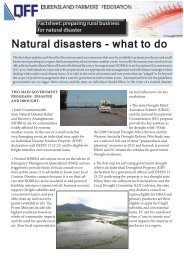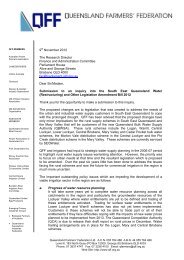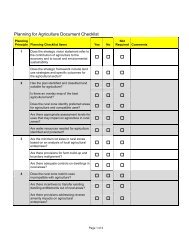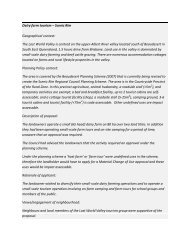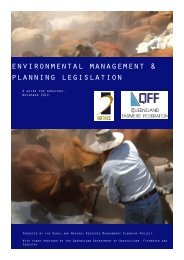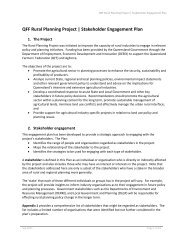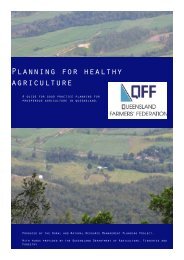here - Queensland Farmers Federation
here - Queensland Farmers Federation
here - Queensland Farmers Federation
Create successful ePaper yourself
Turn your PDF publications into a flip-book with our unique Google optimized e-Paper software.
CSG and Mining Issues<br />
T<strong>here</strong>fore its structures should not be tied to<br />
the political support of a Minister or a political party.<br />
The Commission must facilitate transparent access<br />
to information for all in the community, which for CSG<br />
must focus on issues such as groundwater impacts,<br />
land access compensation thresholds, and the<br />
development plans across gas fields and regional<br />
farming landscapes.<br />
It also needs to inform Government decisionmaking<br />
in approving projects and setting development<br />
conditions.<br />
The Commission’s role must also be able to<br />
mesh with proposed Government regional planning,<br />
which must help CSG projects to foster wider industry<br />
and community development.<br />
QFF also expects to see improved<br />
communication and resolution of issues in the<br />
industry, bringing together stakeholders at all levels,<br />
and providing an avenue to discuss the impacts<br />
of CSG projects and solutions to such issues by<br />
providing the forum and the leadership to have the<br />
parties work together.<br />
Land Access Review Panel<br />
An independent panel has undertaken the important<br />
task of reviewing <strong>Queensland</strong>’s Land Access<br />
Framework, and has released its 12-month report<br />
into the laws. The report is another important step to<br />
help form policy around ensuring the best outcomes<br />
between farmers and the resources sector in<br />
<strong>Queensland</strong> in relation to land access.<br />
The review was an opportunity to look at the<br />
land access framework, which was modified in 2010,<br />
and to understand real examples of how the process<br />
was implemented. It was an opportunity for the panel<br />
to gather real data and on-ground evidence of what<br />
has been occurring.<br />
QFF joined many other industry organisations<br />
and individual farmers to provide submissions and<br />
oral information to the review. In releasing its report<br />
earlier this year, the panel highlighted that the State<br />
Government has a difficult job in balancing the needs<br />
of agriculture and mining.<br />
A significant recommendation of the review<br />
panel is for the government to notify landholders<br />
who are covered by a tenure, at the time the tenure<br />
is granted. This would help mitigate the unpleasant<br />
surprise many landholders have received when early<br />
project or exploration work is to take place on their<br />
properties and this is the first they have heard of it.<br />
T<strong>here</strong> are also recommendations for an<br />
independent panel to determine disputes, as well as<br />
for a third party to clarify the costs of agreements.<br />
Page 11<br />
The review panel made a number of other sensible<br />
recommendations.<br />
<strong>Queensland</strong> Water Commission Report<br />
In June 2012, the <strong>Queensland</strong> Water Commission<br />
released a comprehensive report on the potential<br />
impact of CSG activities on underground water<br />
supplies across southern and central <strong>Queensland</strong>.<br />
The report depicted a varying range of impacts, some<br />
of which will be very severe, and others less severe.<br />
For QFF and our members, a key focus has been on<br />
the potential impact on the Condamine Alluvium. The<br />
alluvium is an incredibly important water resource for<br />
communities and irrigated agriculture on the Darling<br />
Downs, including the production of crops such as<br />
cotton, grain, and horticultural crops.<br />
The QWC estimated that the average<br />
drawdown of this aquifer will be half a metre and<br />
the maximum will be 1.2 metres. QFF stated upon<br />
release of the report that the fundamentals of CSG<br />
must continue to be that it is underpinned by clear,<br />
independent and publicly communicated science<br />
and that its impacts – particularly upon groundwater<br />
– were monitored in very fine detail.<br />
It is crucial that the science of CSG is sound,<br />
that the make-good agreements are iron clad<br />
protection for farmers, and that resource companies<br />
take responsibility for any negative impacts they<br />
create. Rural businesses must not be put at risk from<br />
this development.<br />
Strategic Cropping Land<br />
The passage of the Strategic Cropping Land Bill<br />
2011 through Parliament in October was a major<br />
milestone and another step in ensuring <strong>Queensland</strong><br />
agricultural assets are protected for the long term.<br />
With bipartisan support, the bill passed after a<br />
comprehensive two-year development phase,<br />
which QFF was heavily involved in throughout.<br />
This legislation is not the silver bullet to protecting<br />
all farming country from all development activities,<br />
but it is an important starting point. In addition,<br />
t<strong>here</strong> is much more work ahead in better defining<br />
<strong>Queensland</strong>’s diverse range of soils and farming<br />
systems, many of which are highly productive.<br />
Most resource development projects that are well<br />
advanced will continue unchanged, and most CSG<br />
projects will be treated similarly.<br />
However, this legislation is an enormous<br />
policy step toward providing a safety net for our<br />
best farming land, which is something that is being<br />
recognised by all political parties and increasingly by<br />
urban communities.



